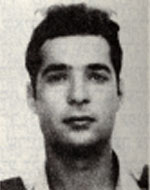Yehuda, son of Rachel and Dov, was born on 7.6.1949 in Kibbutz Mesilot and studied at the kibbutz elementary school. He then graduated from the Gilboa Regional Institute near Kibbutz Beit Alpha. Yehuda combined his rich personality with fascinating contrasts, contrasts that characterized him in all his ways: in his youth and youth, in the kibbutz and in Betis. Already in his youth at the Gilboa Institute, he was prominent as a leader, an active public figure; But there was also a “father and mother’s child”, well groomed and spoiled. He is a vigorous, sharp man, and demands a lot of himself and others, yet he has a cultivated culture and manners, as if he were educated in a noble house; Gentle in his behavior and his attitude towards others. He fulfilled all his duties as a model student, as a devoted mentor of his young guard, as an activist in social and cultural life, but he was careful to guard his private and personal corner and his private interests and interests. For a number of years he played as a trombone player in the Kibbutzim orchestra, but he did not speak much about his deep love for music. He was conspicuous in his deep ties with the warm home of his parents. When he told him, with radiant eyes, how good he was in his parents’ room, the emotional child within the leader, who demanded that his friends (and himself) “be okay” was revealed. He was the kind of “good-boy,” the nurse, “those who take care of the culture, the organizers of society, reach out. He had quiet leadership, but did not take over. He was the first among equals. “Yehuda was drafted into the IDF in late October 1968 and volunteered for an aviation course. At the beginning of his career, he was a pilot. YVA, as his friends in the IDF affectionately called him, was not a classic military man, but he fulfilled his role as a pilot with the feeling that “we must do it”; Meticulously, diligently, accurately, efficiently. His apprentices remember him as a man who knew how to be both a guide and a friend. He did not “keep his distance” and helped his students (especially those who had difficulty in learning) more than was formally required. At the same time, he was careful to follow his instructions and demanded “exact performance”. In fact, he did not need to base his leadership on formal military discipline. Precisely because of humility and kindness, he had a natural and genuine authority. Even the aura that angers pilots in Israel did not suit him. He loved the beauty of the flight, the distant landscapes and horizons revealed in flight. “You are in the country,” he once described it, “and sees Turkey.” Despite his successes as a pilot and despite the prestige and status of the pilot, Yehuda planned to finish his regular service in November 1973 and return to his kibbutz, Mesilot. His commander recommended that on the eve of his release he be allowed a month-long tour of Europe, “to expand the horizons.” The first trip abroad (together with his girlfriend Ruti) was perceived by Yehuda as a true crossroads, and the separation from the country to five miraculous weeks also helped him examine himself and see more clearly where he stands and what is next? He wrote: “I find out more and more how much the trip was there, even in terms of timing. I knew that I wanted to be discharged from the army because of different thoughts about the personal direction that the army was continuing to create. The timing of the trip was very convenient for me because it simply helped me get out of the army, even though the alternative is still unclear to me … I will continue to erase things I do not want, without knowing yet what I want, but I think the tools to look for the “yes” are good now Much more, and perhaps more complete with feeling. “But the time for the new beginning in the kibbutz was not left for Judah, and about three weeks before the liberation, the Yom Kippur War broke out, on which he fought as a Skyhawk pilot on the northern front. 1973), Yehuda’s plane was hit by a ground-to-air missile during an attack on a Syrian armored convoy that was moving onThe way between stemmed and commercial. Judah fell in enemy territory and seemed to reach the ground safe and sound. Two cars were seen fighting, and soldiers were shooting at him. On October 19, Judah was declared missing. For almost five months, his family and friends did not know what had become of him, lived with the uncertainty and held on to the hope that he was in Syrian captivity. But his name was not on the list of prisoners from Syria. Upon the return of the dead bodies, which were in the hands of the Syrians, he was brought to eternal rest in the cemetery on Kibbutz Mesilot. Survived by his parents, two sisters and a friend. The hope that was hidden deep in the hearts of his lovers faded away – the expectation of a miracle did not materialize.
